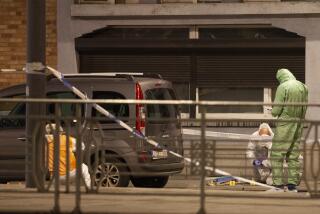Kidnap Deaths Plunge Belgium Into Guilt
- Share via
LIEGE, Belgium — “We were only eight years old, and we had lots of dreams. We thought life would be beautiful. You grown-ups, prepare us a better world.”
--Memorial placard written by the parents of Melissa Russo and Julie Lejeune
****
The dark circles beneath Gino Russo’s heavy eyes tell the story of a father’s living hell.
For more than a year, the Belgian steelworker searched the world for his daughter, Melissa, who was 8 when she disappeared one day last summer while playing with a friend in a suburb of this gritty industrial town in eastern Belgium.
Italy, Spain and Holland. No Melissa. Mexico, Argentina and Brazil. No Melissa. Germany and Canada. Still no Melissa.
Several weeks ago, a despairing Russo told his wife that he had a hunch their daughter was closer to home. He was tragically right. Within a few days, the bodies of the little girl and her playmate turned up in the backyard garden of a convicted pedophile about 50 miles from here.
The sexual abuse and killing of two third-graders would break the heart of almost anyone, but the case of Melissa Russo and Julie Lejeune has done much more. Their horror has turned an entire country inside out, at once uniting Belgium’s disparate cultures in grief and shattering their faith in the decency of their shared society.
“We were saying from the very beginning that Melissa and Julie were probably in Belgium,” said Russo, 36, who helped distribute 10,000 posters of the missing girls in this tiny country and abroad. “But everyone said such a thing was not possible here. We stood alone.”
Melissa and Julie not only died the most horrible of deaths on Belgian soil but did so after their parents’ desperate pleas for help were dismissed by the authorities and nearly everyone else. In the aftermath, practically no one in this country of 10 million, unaccustomed to such national trauma, is able to look Gino Russo straight in his tearful eyes.
“There is a lot of rage right now over what happened to these two girls, but it comes partly from a deep sense of guilt,” said Michele Hirsch, a Brussels attorney who has handled pedophile cases. “We all feel culpable. Maybe if more of us believed like the parents did, the girls would still be alive.”
Belgium is a country where scandals typically erupt from politics and its linguistic divide--the contentious line that separates Dutch-speaking Flemish provinces from the French-speaking Walloons--not from society’s failure to protect its most vulnerable members. Violent crime is relatively low, and pedophilia is regarded as the scourge of sandy beaches in Southeast Asia, not the wooded flatlands of Western Europe.
But the case of Melissa and Julie has suddenly changed all that. An angry and traumatized public has forgotten its language war and vented its collective fury on the system, blaming the police, the courts and the political establishment for having failed the two girls--and the rest of Belgium with them.
“I never imagined that something so horrible could happen on our own doorstep,” said Marie-Joelle Bouzet, whose daughter, Elisabeth Brichet, has been missing since 1989, when the 12-year-old went to visit a neighborhood friend. “We have to keep up the public pressure long enough to force the politicians to change it all.”
The indignation has grown even greater in recent days as speculation mounts that politics was involved from the beginning in the still-unfolding pedophilia scandal, which already has led to 10 arrests.
Russo, Bouzet and others allege that well-connected suspects have been afforded “political protection” by authorities, and a highly regarded children’s activist, Marie-France Botte, claims that the Justice Ministry is sitting on a politically sensitive list of customers of pedophile videotapes produced by Melissa and Julie’s accused abductors.
The affair has become further clouded by the unexplained discovery of a motorcycle at the home of the main suspect, convicted child rapist Marc Dutroux, that reportedly matches the description of one used in the 1991 assassination of prominent Belgian businessman and politician Andre Cools.
Michel Bourlet, the head prosecutor on the pedophile case, meanwhile, has publicly declared that the investigation can be thoroughly pursued only without political interference. Several years ago, Bourlet was removed from the highly charged Cools case, which remains unsolved.
“In situations like this, Belgians tend to stick together and turn against the state,” sociologist Claude Javeau said. “There has always been a climate of distrust against the state. . . . It is a country where [state officials] have to be careful all of the time.”
But as the sordid details of the girls’ ordeal become known, the growing likelihood that a Belgium-based pedophile network was responsible for Melissa’s and Julie’s deaths has also compelled Belgians to look inward for answers to many troubling questions, including why they have been so slow to address problems of missing children and sexual abuse.
The police only set up a national task force on missing persons last year, after the abduction of Melissa, Julie and several other young girls set off a panic among parents. Until then, there was virtually no cooperation among the scores of municipal police forces and the national gendarmerie, all of which worked on the presumption that missing children were runaways.
“Just a year ago, when the parents were coming in, the first reaction was, ‘Come back tomorrow if your child still hasn’t returned home,’ ” said Van Rillaer, who heads a staff of five in the missing persons unit. “Now everyone is aware of the problem, and they don’t take that risk anymore.”
The Belgian government, meanwhile, just last week approved new measures to make it tougher for sex offenders to qualify for early release from prison. Dutroux, 39, served less than half of a 13-year sentence for raping five girls--the youngest of whom was 11--in the mid-1980s. After his release, which was conditioned on psychiatric counseling, there was no serious follow-up--an indication, critics say, of the country’s lackluster attitude in fighting pedophilia.
“Small acts of pedophilia, such as a man watching a child undress at the swimming pool, may seem harmless to the child, but we must realize that these small happenings can lead to bigger and more serious things,” said Tommy Scholtes, a Roman Catholic priest who runs a religious radio station in Brussels. “The worst crime of pedophilia has been exposed by these killings. It is not only adults having sex with kids. It can be murder.”
At the core of Belgium’s heartache is the sickening realization that Melissa and Julie were alive for nine months following their abduction but that a series of clues and tips about their whereabouts were so mishandled by the authorities that no one ever found them alive.
Police said Dutroux, allegedly their main captor, made the girls’ lives hellish, confining them to a windowless subterranean dungeon, where they were sexually assaulted while being videotaped for pornographic films.
But Dutroux has told police that the girls did not die until March, when they succumbed to starvation in their concrete quarters within a day or two of his release from jail, where he had been held since December on suspicion of theft. Belgian media have reported that Dutroux’s wife, Michele Martin, told police that she was supposed to have fed the girls while Dutroux was in custody, but Martin said she could not muster the courage to enter their underground cell.
“I want [Dutroux] to die just like he killed Julie and Melissa,” 10-year-old Jenifer Dirick said this weekend at the McDonald’s not far from where the two girls were abducted. “I wouldn’t give him any food and would let him die very slowly.”
Revelations about Melissa and Julie’s last months alive have brought similar calls for revenge throughout Belgium. Hundreds of thousands of people have signed petitions, including one calling for the reinstatement of the death penalty, which was abolished last year. Others have demanded harsher prison sentences for pedophiles and strict controls on early release programs.
But cries for blood have had a mostly hollow ring for the Russo and Lejeune families. Both sets of parents have refused to lend their names to pro-capital punishment causes. In a statement issued at the time of the girls’ funerals two weeks ago, the families tugged at the consciences of ordinary Belgians.
“It is pedophilia that killed our children, but it is also the incredible arrogance shown by those who have the mission to protect our children,” they said. “It is pedophilia that killed them, but also the doubts of all those who didn’t want anyone to imagine them alive.”
Gino Russo says it is that message that the families will sound again and again during the coming weeks. As the public remains transfixed by the grisly search for more possible victims, Russo said he will not let ordinary Belgians forget their complicity in the crime.
“Our only hope for change is to build on the guilt everyone is feeling right now,” Russo said, his face twitching with emotion and fatigue. “Everyone knows now that these pedophile networks exist. They are not just the problems of the pedophiles or the police but of the people that live in a system that allows them to be.”
Russo is exhausted. He says his head feels like it is about to explode. He hasn’t been to work since the day Melissa disappeared. But he cannot stop now. Melissa may be gone, he says, but her brother, Gregory, 12, is not.
“This is the only way I know to keep Melissa and Julie alive,” he said.
More to Read
Sign up for Essential California
The most important California stories and recommendations in your inbox every morning.
You may occasionally receive promotional content from the Los Angeles Times.













